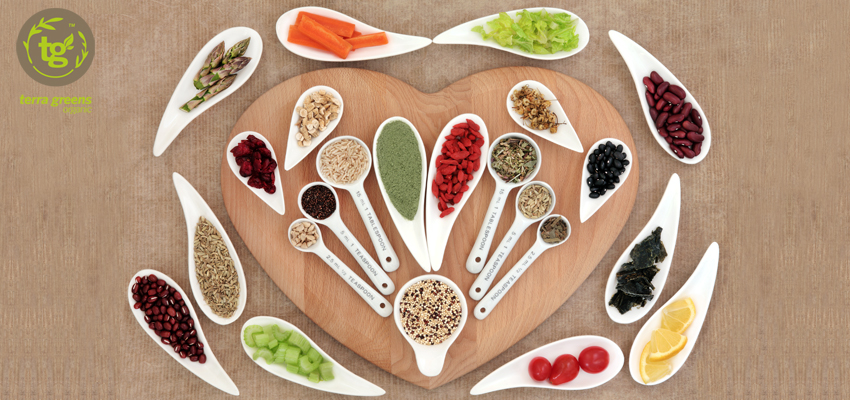Our hectic lifestyles and busy schedules have left us with little room to unwind and relax, while creating ample room for stress, particularly distress. Stress can have several implications on your health, taking a toll on your physical, mental and emotional well-being.
Common symptoms of stress include faster heartbeat, headaches, stiff neck or tight shoulders, sweating or sweaty palms, nausea, irregular sleep patterns, mood swings and so on. Another well-known symptom of stress is overeating, particularly high carb and high sugar ‘comfort foods’.
These foods, in large quantities tend to create a metabolic imbalance, leading to weight gain, high risk of obesity, cardiovascular problems, high blood sugar levels, and ultimately, more stress.
Calming foods, on the other hand help soothe and calm you, and are a healthy source of energy. Here is a list of 10 calming superfoods that help reduce stress and keep you feeling focused and balanced.
10 Superfoods For Your heart To Have A Healthier Life
Avocados
Avocados are a treasure-trove of stress-relieving B Vitamins; they also contain monounsaturated fat and potassium, which help lower blood pressure. Vitamin B boosts nerve and brain cell health; studies show that anxiety can be caused by B Vitamin deficiency. Glutathione, a substance that specifically blocks intestinal absorption of certain fats which can cause oxidative damage, is present in abundance in avocados, along with Beta-Carotene, Lutein, Vitamin E, Vitamin B and Folate.
Asparagus
Low levels of folic acid have been attributed to depression; asparagus is super-rich in folic acid, so much so that a single cup can provide two-third of your daily folic acid requirement. You can incorporate asparagus into almost any meal – add some to your breakfast omelette or steam it with some poultry or fish. You can also enjoy some steamed spears of asparagus with a dip of your choice.
Milk
Rich in antioxidants, Vitamins B2 and B12, calcium and protein, a glass of warm milk is an age-old remedy for insomnia. Milk is also high in the protein Lactium, which is known to have a calming or soothing effect due to its ability to lower blood pressure. The potassium in milk is known to help relieve muscle spasms that are triggered by physical tensing.
Almonds
Enjoy a daily helping of a handful of almonds to keep stress at bay! Almonds are rich in Vitamin B2 and Vitamin E, both of which are known to boost the immune system when the body is stressed out.
Oatmeal
This high-fibre complex carbohydrate food helps boost serotonin production in the body, a hormone that essentially creates a calming effect in the body. Enjoy a bowl of warm oatmeal in the morning for breakfast, especially on days when you are feeling stressed. Moreover, oats help in maintaining cardiovascular health as they absorb bad cholesterol (high-density lipoprotein) from the body.
Spinach
Green-leafy vegetables are a dietary must-have; what is great about spinach is that it is loaded with magnesium, a mineral that works to regulate cortisol levels in the body. A single cup of spinach provides you with 40% of your daily requirement of magnesium. You can have it in the form of a fresh salad or steam it with some pulses and enjoy with Rotis or steamed rice.
Salmon
This fatty fish is rich in omega-3 fatty acids that help control cortisol and adrenaline levels in the body and prevent them from spiking when you are feeling tense or agitated. Additionally the omega-3 fatty acids are excellent for heart health and salmon is one of the richest sources of this heart-healthy fatty acid.
Green Tea
Replace caffeinated beverages with green tea, which contains L-Theanine, an amino acid that promotes relaxation. Consume a few cups of warm green tea daily for that much needed calming and soothing feeling that a stressed you craves for!
Oranges
This citrus fruit is a rich source of Vitamin C, which helps control the levels of cortisol in the body, strengthening the immune system and helping maintain the blood pressure. Incorporate oranges into your regime, replacing high carb snacks, to reduce your stress levels daily.
Bananas
Bananas contain ample amounts of dopamine, a chemical that is known to uplift your mood levels. Moreover, they are rich sources of B Vitamins, including Vitamin B6, that work to soothe the nervous system. They are also loaded with magnesium, a mineral linked with mood positivity.
These 10 foods, when consumed regularly, can help reduce your stress levels. Incorporate these superfoods into your diet and focus on a regime that includes meditation, physical exercise and a regular sleep cycle.



